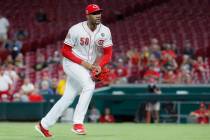MLB payrolls dropped for 1st time since 2010 due to suspensions

NEW YORK — Spending on Major League Baseball payrolls dropped last season for the first time since 2010, an $18 million decrease attributable to drug and domestic violence suspensions and a player retiring at midseason.
Still, even a year with flat payrolls is unusual for MLB. The only previous drops since 2002 were by $3 million in 2010 and by $32 million in 2004.
Teams combined to spend $4.23 billion on major league payroll last year, according to final figures compiled by the commissioner’s office and obtained by The Associated Press. The decrease followed an offseason with a weak free-agent class that failed to push the average higher.
Seattle second baseman Robinson Cano lost about $11.7 million and Chicago White Sox catcher Welington Castillo approximately $3.5 million after positive drug tests. Closer Roberto Osuna’s domestic violence suspension cost him roughly $2.1 million from Toronto and Houston, and Baltimore outfielder Colby Rasmus walked away from about $1.5 million rather than try to come back from a hip injury.
World Series champion Boston had the highest payroll for the first time since the free-agent era started in 1976 at $230 million. In a sign of increasing parity, a record 24 teams had $100 million payrolls, and the Red Sox figure was the lowest for the top big league payroll since 2012. Luxury tax surcharges that started for the 2017 season appear to have changed behavior of high-revenue teams.
MLB Deputy Commissioner Dan Halem said the slice of revenue going to major and minor league players last year was 54.2 percent, the same as in 2012. He cited a $9.4 billion revenue figure for 2018, up from $9.1 billion in 2017, and luxury tax payrolls, which use average annual values of contracts and include benefits. MLB pegged the average salary increase at 29.1 percent since 2012 and the average luxury tax payroll rise since then at 28.4 percent.
“So although the top payroll in 2018 was the lowest since 2012, the average payroll has increased significantly, which means MLB has had payroll compression — which is a good thing for competitive balance,” he said.
Union head Tony Clark declined to comment, spokesman Chris Dahl said.
Agent Scott Boras claimed the players’ portion of the money has declined.
“The luxury tax, the new elements have dramatically quelled the market,” he said. “The allocation of revenues to payroll has gone down.”
Both sides agree on one fact: The pace of free-agent signings has slowed dramatically in recent offseasons. Jeff Berry, an agent who co-heads CAA Baseball, suggested a call to action in a memo he circulated last year that included suggestions such as boycotting marketing appearances and delaying arrival at spring training until the mandatory report date in late February.
“Despite increasing MLB revenues and franchise valuations, in this new world order of analytics, aging curves, tanking, shifting, openers, bull-penning, declining attendance and declining salaries, players should and do feel vulnerable and unsure,” he wrote. “Rather than saber rattling about a potential strike in three years, the focus should be on taking pro-active steps to address current labor issues in the hope of avoiding a strike in 2021.”
San Francisco had the second-highest regular payroll at $210 million, followed by the Chicago Cubs at $199 million.
Top-spending teams cut payroll to get below the luxury tax threshold in order to reset their tax rate. Only the Red Sox and Washington Nationals paid tax.
The Los Angeles Dodgers dropped to fourth at $196 million after leading the major leagues for four straight years. The Dodgers, who spent a record $291 million in 2015, cut by $48 million from 2017 and had their smallest payroll since 2012, yet they won a second straight NL pennant.
Washington was fifth at $185 million, followed by the New York Yankees at $183 million — a drop of more than $25 million from 2017 and their smallest since 2003. The Yankees had not been as low as sixth since they were ninth in 1992 at $34.5 million in the final season of owner George Steinbrenner’s 2½-year suspension.
Just five of the top 10 spenders made the playoffs, with San Francisco and Washington missing along with the Los Angeles Angels (seventh at $177 million), St. Louis (eighth at $166 million) and Seattle (10th at $162 million).
Other playoff teams included Colorado (14th at $148 million), Cleveland (15th at $146 million), Atlanta (20th at $127 million), Milwaukee (22nd at $108 million, up $40 million from 2017’s big league low) and Oakland (28th at $78 million).
Tampa Bay had the lowest payroll for the first time since 2007, at $75.1 million finishing $92,526 below the Chicago White Sox.
Payrolls are for 40-man rosters and include salaries and prorated shares of signing bonuses, earned incentive bonuses, non-cash compensation, buyouts of unexercised options and cash transactions. In some cases, parts of salaries that are deferred are discounted to reflect present-day values.
The average salary dropped for the first time since 2004 and for only the fourth time since record-keeping started 50 years ago, according to players’ association calculations. The union pegged its average at $4,095,686, down $1,436 from last year.
Since the union started keeping track in 1967, the only previous declines had been by $66 in 1987, when owners were found to have conspired to hold down salaries among free agents; a 5 percent decline in 1995 following a 7½ -month strike that wiped out the World Series for the first time since 1904; and by 2.5 percent in 2004.
MLB determined its average was $4,007,987, up from $3,955,920 in 2017. The average is based on 968 players on major league rosters and disabled lists on Aug. 31, the last day before the active player limit expanded from 25 to 40. That figure is impacted by the number of players on the DL because replacements usually make close to the minimum.
The union includes option buyouts in its average calculation while MLB does not.












